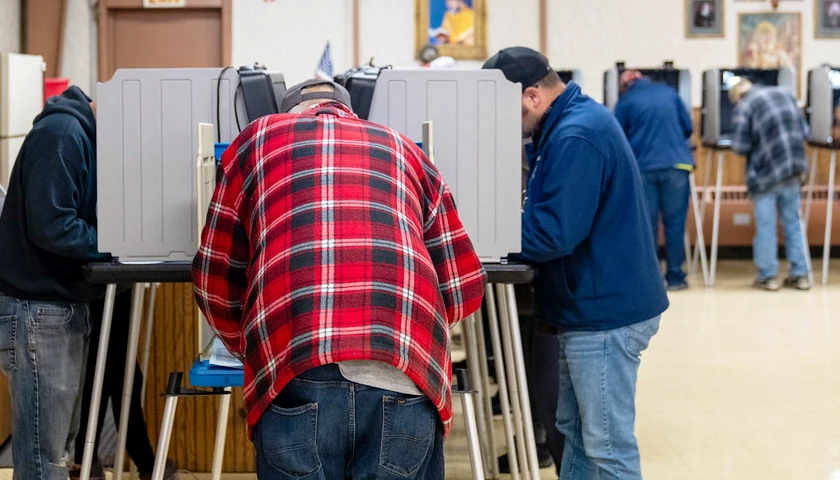Friday, a Wake County Superior Court judge’s ruling involving state constitutional amendments has left half of North Carolina’s voters disenfranchised.
Superior Court Judge George Bryan Collins, Jr. ruled that two out of four state constitutional amendments passed by North Carolina voters in 2018 were illegal because the state legislature was itself ‘illegal’.
“An illegally constituted General Assembly does not represent the people of North Carolina and is therefore not empowered to pass legislation that would amend the state’s constitution,” Collins wrote in his ruling.
The suit Collins ruled on specifically only sought to invalidate only two of four passed amendments. The case was brought by the Southern Environment Law Center on behalf of the NC NAACP and an affiliated legal group called “Forward Justice.” According to state and federal records, Forward Justice only recently obtained 501(c)3 status had previously been named Southern Strategy Project and Southern Justice.
“We are delighted that the acts of the previous majority, which came to power through the use of racially discriminatory maps, have been checked,” said Rev. Dr. T. Anthony Spearman of the NC NAACP.
Responses from state leaders were swift, calling the ruling outrageous and a clear act of ‘judicial activism’.
“We will fight for North Carolinians’ voice in support of voter ID and a lower income tax cap,” North Carolina Speaker of the House Tim Moore said. “The people have spoken and this outrageous attempt to invalidate their decisions will be appealed.”
“Although the ruling only directly invalidates the two laws that were challenged in the suit, under Judge Collins’s theory every act passed by the General Assembly between June 5, 2017, and December 31, 2018, is invalid,” says the statement issued by the office of Senate Pro Tempore Phil Berger.
“We are duty-bound to appeal this absurd decision,” said Senate Leader Phil Berger (R-Rockingham) in the statement. “The prospect of invalidating 18 months of laws is the definition of chaos and confusion. Based on tonight’s opinion and others over the past several years, it appears the idea of judicial restraint has completely left the state of North Carolina.”
The statement from Berger’s office also notes that “no court in the history of the United States has ever declared a state legislature to be an illegal body.”
“I am legitimately concerned about the future of our state and country with opinions like this abomination,” said Senator Ralph Hise (R-Mitchell), Chair of the Senate Redistricting and Elections Committee. “One man with a political axe to grind invalidated millions of votes and potentially dozens of laws, including the state budget. Two million voters decided to add voter ID to their state constitution, but one Democrat on a power high is invalidating their will.”
In the ruling, Judge Collins draws from the U.S. Supreme Court ruling in 2017 on North Carolina v. Covington. In their ruling, the Supreme Court upheld that 28 voting districts had been racially gerrymandered, new maps were ordered redrawn under a Special Master.
Judge Collins’ ruling seems to be based on the assumption that because the state had been operating on court-approved remedial maps and that the redrawn districts only went into effect in the November 2018 election, then everything from laws to state elections for the last six years has either ‘illegal’ or ‘invalid’.
The ruling, if upheld, would wide-ranging implications. If upheld, arguably every legislature election and law passed between 18 months to six years ago could be held as invalid – including Judge Collins’ own election in 2012.
The two amendments affected are Voter ID and a state tax cap of 7%, each with millions of votes that have now been invalidated. Both of the amendments passed by wide margins:
Maximum Tax Rate of 7%
For 2,094,924 ( 57.35% )
Against 1,557,707 ( 42.65% )
Passed by 537,217 votes or +14.70%
Require Photo ID to Vote
For 2,049,121 ( 55.49% )
Against 1,643,983 ( 44.51% )
Passed by 405,138 votes +10.98%
How many voters have been disenfranchised by Collins’ ruling? Over half of all North Carolina registered voters.
7,092,686 registered voters were on the rolls in North Carolina on election day in 2018 and 3,755,778 ballots were cast. The tax rate amendment has 3,652,631 total votes attached to it and the voter ID amendment has 3,693,104 total votes. These two amendments have vote totals which represent roughly 52% of the voting population of the state.
Several years ago, North Carolina passed a voter ID law that was later struck down as unconstitutional after the 4th Circuit Court of Appeals ruled that the law targeted “African Americans with almost surgical precision.”
It now appears that, in his ruling, Judge Collins has targeted millions of North Carolina voters with the same kind of “surgical precision.”
– – –
A.P. Dillon is the North Carolina Bureau Chief for The Tennesee Star and a reporter at Battleground State News. Follow A.P. Dillon on Twitter. Email Tips to [email protected].





